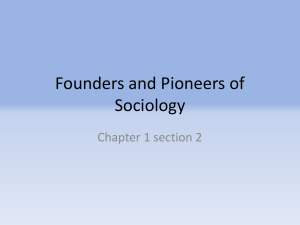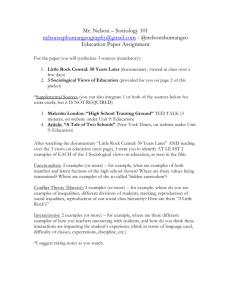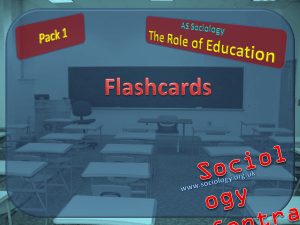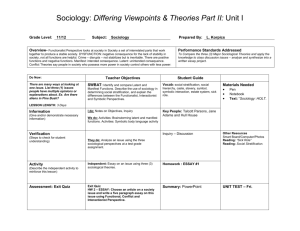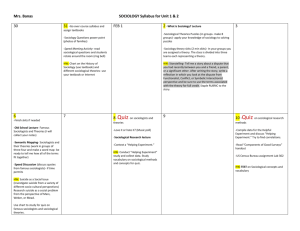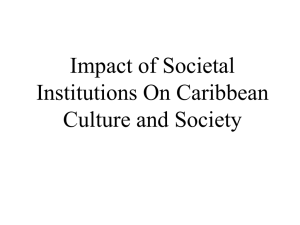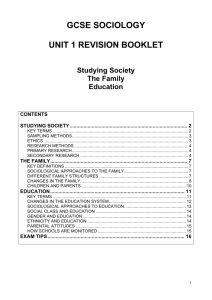CHCYTH402A-Perspectives
advertisement
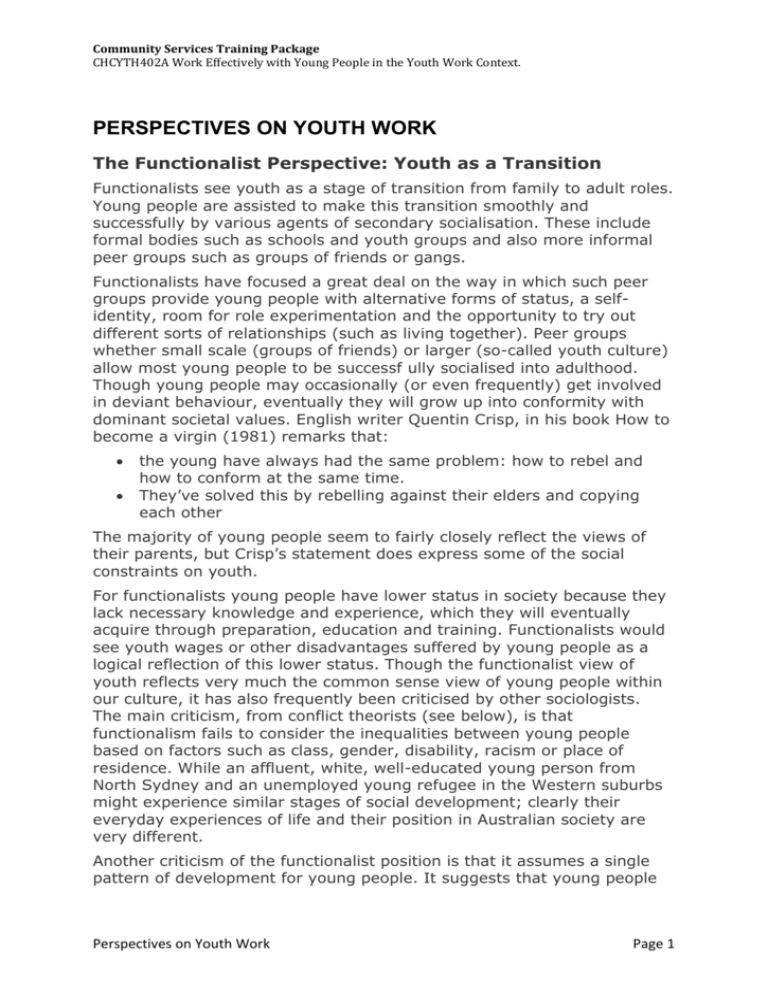
Community Services Training Package CHCYTH402A Work Effectively with Young People in the Youth Work Context. PERSPECTIVES ON YOUTH WORK The Functionalist Perspective: Youth as a Transition Functionalists see youth as a stage of transition from family to adult roles. Young people are assisted to make this transition smoothly and successfully by various agents of secondary socialisation. These include formal bodies such as schools and youth groups and also more informal peer groups such as groups of friends or gangs. Functionalists have focused a great deal on the way in which such peer groups provide young people with alternative forms of status, a selfidentity, room for role experimentation and the opportunity to try out different sorts of relationships (such as living together). Peer groups whether small scale (groups of friends) or larger (so-called youth culture) allow most young people to be successf ully socialised into adulthood. Though young people may occasionally (or even frequently) get involved in deviant behaviour, eventually they will grow up into conformity with dominant societal values. English writer Quentin Crisp, in his book How to become a virgin (1981) remarks that: the young have always had the same problem: how to rebel and how to conform at the same time. They’ve solved this by rebelling against their elders and copying each other The majority of young people seem to fairly closely reflect the views of their parents, but Crisp’s statement does express some of the social constraints on youth. For functionalists young people have lower status in society because they lack necessary knowledge and experience, which they will eventually acquire through preparation, education and training. Functionalists would see youth wages or other disadvantages suffered by young people as a logical reflection of this lower status. Though the functionalist view of youth reflects very much the common sense view of young people within our culture, it has also frequently been criticised by other sociologists. The main criticism, from conflict theorists (see below), is that functionalism fails to consider the inequalities between young people based on factors such as class, gender, disability, racism or place of residence. While an affluent, white, well-educated young person from North Sydney and an unemployed young refugee in the Western suburbs might experience similar stages of social development; clearly their everyday experiences of life and their position in Australian society are very different. Another criticism of the functionalist position is that it assumes a single pattern of development for young people. It suggests that young people Perspectives on Youth Work Page 1 Community Services Training Package CHCYTH402A Work Effectively with Young People in the Youth Work Context. must eventually ‘grow up’ to adopt the dominant sets of ideas, behaviour and values of our society or else be labelled as ‘deviant’: The ‘correct way’ to do things was to get a job, save for a home, get engaged, get married and then move into one’s own house [in that order] (quoted in F. Mass, ‘Becoming adult’ Youth studies. Feb 1990) As we have seen, such values are likely to be those of middle-class, middle-aged, white, male, ‘middle Australia’. But there are always going to be many young people who cannot or do not wish to adopt such a lifestyle. Functionalists generally have difficulty coming to terms with diversity, inequality or change in society. These factors are emphasised by conflict sociologists. Conflict Theorists: Youth and Structural Inequality Functionalists and conflict theorists have at least one thing in common: they each analyse society in a macro sociological way. They tend to focus on the broader processes in society in order to understand the experiences of individuals and groups within it. Functionalists, as you have seen, focus on the ways in which young people come to generally conform to the society of which they are a part. Conflict theorists seek to explain how young people are constrained and shaped by the structures of society: particularly the structural social inequalities of class, gender and ethnicity. An eloquent and persuasive summary of the conflict perspective can be found in the work of Rob White: If young people are rebellious, if they are apathetic, if they are attempting to shut out the outside world, if they are committing crimes, if they are engaging in the politics of fear or of possibility, they are doing so for specific reasons. The search for a space of their own is a response on the part of working-class young people to a society in crisis, one that has forsaken social principles of justice, equality and humanity for the benefit of the wealthy and powerful. Ultimately the problems associated with the ‘broken transitions of youth’ cannot be reduced to a lack of discipline or skill, or the impact of technology, they stem from and are a reflection of social structures that privilege the powerful while consigning the less powerful to poverty, alienation and the ignominious drudgery of hand-tomouth existence (White, R. No space of their own, Melbourne University Press, 1990, p.213). As you may have already worked out, the differences between functionalist and conflict theories of youth reflect broader political and professional differences in society. The functionalist approach reflects very much a common sense approach to youth, whereby young people are largely lumped together as ‘trainee adults’ who may cause a bit of trouble but who will eventually, except for those regarded as ‘deviant’, assume their proper position in society. Much welfare work is concerned with Perspectives on Youth Work Page 2 Community Services Training Package CHCYTH402A Work Effectively with Young People in the Youth Work Context. helping the ‘deviants’ and with ensuring that the majority don’t stray too far from the path. The conflict approach, on the other hand, is reflected in much contemporary youth work and the rhetoric, if not the reality of government policy. It recognises that young people are not all the same and that some, such as Kooris or refugees or young women, suffer from structural inequalities. There is much talk of targeting assistance at such disadvantaged groups and at ‘empowering’ young people. Most of the modules you have already studied or will study, deal with these sorts of issues, and I’m sure you can see both perspectives reflected in what you have read. The Interactionist Perspective: Getting Your Hands Dirty As already mentioned, both functionalists and conflict theorists adopt a macro sociological approach to youth issues. However a great deal of the sociology of youth has focussed on small groups of young people and studied how they think and behave in their own environments. This micro sociological approach often entails an interactionist perspective. (If you are beginning to get confused by all these sociological terms, they will become clearer as you read on and develop your knowledge and awareness levels. The interactionist approach involves looking at small scale interaction between young people, usually within small groups like gangs or groups of friends. A key element of this approach is that it focuses on the way in which meanings are created. It is argued that people do not simply reflect the culture or society of which they are a part. Rather they interact with each other to create a shared world: one which incorporates elements of the broader ‘culture’, but one that also creates its own definitions of reality. The worlds of young people, with their distinctive music, slang, behaviour and ‘styles’ (punks, rockabillies, surfies, skinheads and so on) have always been of great interest to sociologists (and to journalists out for a good ‘colour’ story). Interactionist sociologists often use research techniques derived from anthropology – youth groups are treated as if they were exotic tribes. The sociologist may live with or just hang around with a group for a considerable time to learn their secrets and enter into their worlds. Interactionists argue that only a view from the participants’ own position can adequately explain the reality of young people’s lives. Often the seemingly strange, bizarre or apparently negative worlds of young people are shown to be determined by societal rules and patterns just as is the ‘ordinary’ society. Much of the most interesting sociology of young people is done from an interactionist perspective. But interactionists in general have been criticised for focussing too much on the minute detail of everyday life Perspectives on Youth Work Page 3 Community Services Training Package CHCYTH402A Work Effectively with Young People in the Youth Work Context. while ignoring the broader structures that constrain it. The best sociology takes account of both the broader context and the way in which it affects and is modified by what happens at the micro level. This is an account of a very famous sociological study. It uses the interactionist concept of labelling. This refers to the ways in which individuals or groups in society can become labelled as ‘deviant’, mad, bad or sick by those in power (I’m sure you’ve seen this process in action). This reading shows how an interactionist understanding can be combined with a conflict one: clearly the class backgrounds of the two groups of boys was crucial to the way they were viewed and to the way in which police and other in the community reacted to them. The Feminist Perspective: Putting Girls into the Picture Services directed at youth and the sociology of youth have in many ways shared a similar outlook: a very male dominated one. When the word ‘youth’ is used the image that springs to mind is usually of a young male. This is reflected in much of the sociology of youth and indeed in many of the readings that you have already looked at for this module. Sociologists have tended to focus very much on public, male dominated sub-cultures and environments: the street, the playground, and the factory. The lives of girls, which often have a more private and domestic focus, have been largely ignored. This has also been the case in the provision of services for young people. In the last decade feminist sociologists have attempted to redress the balance and have expanded the focus of youth studies to embrace the experiences of others apart from the white, urban, working-class boys that have been extensively written about in the past. In regard to youth feminist sociology has focused on many issues, each of which emphasises the experiences of young girls and young women. These have included: the discrimination against girls in the education system; lack of leisure provision for girls; the unequal participation of girls in domestic work at home; inadequate employment and training opportunities for girls; the representation of girls in the media… and so on. In youth work these issues have had implications for practice: should girls be worked with separately or together with boys, how can girls’ selfesteem and confidence be rebuilt, what are the most appropriate messages regarding sexuality, what to do with boys? Perspectives on Youth Work Page 4
